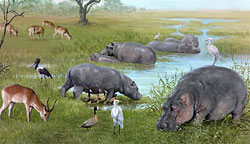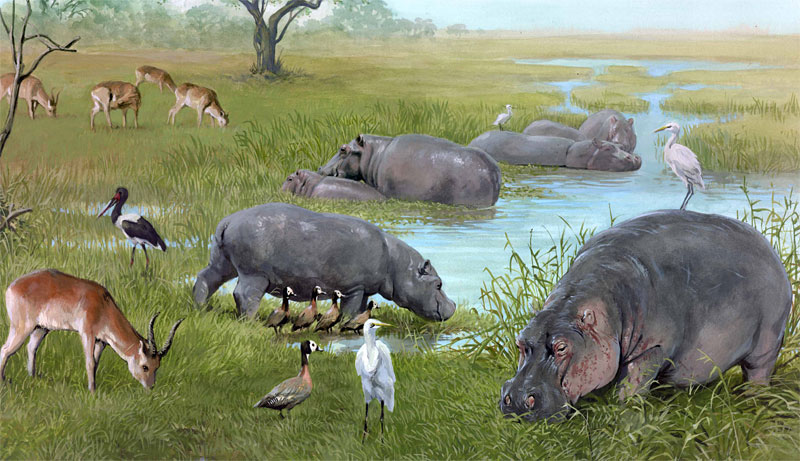IN THE LAND OF HIPPOS
Hippos are very important for their environment. They shape the face of the land and their presence has a substantial impact on the lives of other animals. This is why they are said to be a key species.
CONNOISSEURS OF SHORT GRASS
Hippos adore young grass. They regularly return to their favourite spots and keep the grass short and thick by grazing, just like a lawn mower. This care is welcome by antelopes specialised in short grass, as is the waterbuck.
WATER ENGINEERS
In wetlands such as the Okavango delta, hippos are of great importance. During their movement through the water they break up the accumulation of silt and growth of aquatic plants, and clear channels which would soon disappear without them.
A PACT WITH THE BIRDS
A hippo’s back is an exceptional observation point for birds. Egrets especially like to search for insect or fish prey from this point. While moving about on land, where they are not as sure of themselves, hippos are governed by the warning calls of birds.
FAECES FULL OF NUTRIENTS
Some of the nutrients from ingested grass pass through the hippos and into the water in their faeces. This is utilised by the water snails and insect larvae that birds and fish prey on and which in turn are eaten by larger animals. Everybody hence benefits from hippo droppings.
THE SEVERE DRY SEASON
Once the dry season occurs, a tense period of crowding and disputes begins among the hippos. They need to keep their skin wet, but space in the desiccated water basins is limited. The slightest muddy puddle therefore often becomes the scene of fierce fighting.
A NEVERENDING CYCLE
A grassy environment without scrub suits hippos. There, they crop the grass short and hence reduce the likelihood of fire.
Wood can grow undisturbed in an environment free of fire. Scrub will gradually grow on hippo lawns and the hippos will stop visiting them.
Without hippos grazing on it, grass will grow long, dry out and become prone to igniting at the slightest spark. The resulting fire will consume not only the grass, but also the wood.
Grass will soon sprout again after the fire, while woody plants will be re-established much more slowly. Grass will therefore prevail in the environment.

